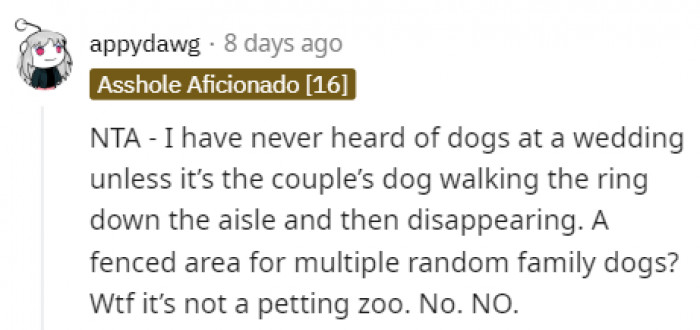Bride Doesn't Want Dogs At Her Wedding Despite The Groom's Wishes
As time goes on, more and more people own pets, and I feel like this trend will continue, which is great to hear, especially if they're adopting pets from their local animal shelters. Since so many people own pets, you always have to keep them in mind when organizing something like a wedding because most people would love to bring their dogs along.
The problem with this is that while pets are fantastic and fun, they can be unpredictable, and having them around for special occasions is risky. Keeping all of these factors in mind, it's hard to blame anyone if they don't allow pets at an event, especially if it's big dogs like in this story.
The story we have for you was posted on Reddit by user u/CrystalRavenWitch because she wanted to get some opinions on whether her no-pet rule for her wedding was too much. She's scared of being labeled a "bridezilla" because she won't let her in-laws bring their dogs to the wedding, especially since one of those is a giant bull mastiff who's bigger than she is!
Her fiancé, however, really wants the dogs to be there, and he guarantees that the dogs will stay within their fencing, but the bride isn't convinced. She believes that the dogs are too unpredictable and that the fencing won't be enough to keep them from making a big mess at the wedding.
So she turned to Reddit to see what other people had to say because she was unsure if she was making a big deal out of nothing. So make sure to scroll down and read the entire story along with some comments from other Redditors that we picked out for you.
She started the story with a disclaimer saying that she loves dogs, but she believes this isn't the right place for them.

To make matters worse, one of the dogs that is supposed to attend the wedding is a huge and untrained bull mastiff.

She believes the dogs will make a huge mess at the wedding, even if they try to fence them in as the groom suggested.

Understanding Personal Boundaries and Expectations
Personal boundaries are crucial in any relationship, particularly when it comes to significant events like weddings. Research in relational psychology emphasizes that individuals have unique expectations and values regarding their personal space and comfort levels. In this case, the bride's decision to implement a no-pet policy reflects her boundaries surrounding her wedding day. Understanding these boundaries can help couples navigate conflicts more effectively and foster mutual respect.
The Psychology of Pet Inclusion
When it comes to weddings and significant events, the inclusion of pets can evoke strong emotional responses. Research in social psychology indicates that pets often represent family and emotional support for their owners. However, differing opinions on pet inclusion can lead to conflicts, as seen in the case of the bride refusing to allow dogs at the wedding.
Understanding these emotional ties can help couples navigate their preferences while respecting each other's feelings.
Some people were surprised by the fact that weddings are considered pet-friendly by default.

It's easy to see how a petting zoo with dogs could cause a lot of issues.

There's a time and place for everything and everyone. Maybe the dogs should sit this one out.

Moreover, the concept of 'family loyalty' can complicate these situations. Individuals often feel a strong sense of obligation to their families, which can create internal conflict when their partner's values differ. A study published in the Journal of Social and Personal Relationships indicates that individuals may experience guilt or anxiety when navigating these conflicting loyalties. Encouraging open dialogue about values and priorities can help individuals articulate their feelings and find common ground in their relationships.
Moreover, the role of societal norms plays a crucial part in shaping expectations around events like weddings. Studies show that societal expectations can influence how individuals perceive the appropriateness of including pets in significant life events. Recognizing these norms can help couples communicate their desires effectively and find common ground.
This Redditor's comment made me laugh.

Most people love dogs, but there are still many who wouldn't appreciate them being there.

Must be a very tolerant venue.

The Role of Compromise in Relationships
Compromise is a fundamental aspect of healthy relationships, particularly when navigating differences in values. Research indicates that successful couples often engage in collaborative problem-solving, seeking solutions that honor both partners' perspectives. In this case, discussing potential compromises, such as setting boundaries for the dog in the home, can help both partners feel heard and respected. Encouraging collaborative discussions can foster a sense of teamwork and strengthen the relationship.
Communication in Couples
Effective communication is essential for navigating differing opinions in relationships. Research indicates that couples who practice open dialogue about their preferences and feelings tend to have healthier relationships. Encouraging vulnerability and honesty can foster greater intimacy and understanding, ultimately leading to more harmonious decision-making.
Creating a safe space for these discussions can enhance emotional security and reduce conflict.
Train your dogs, people.

As expected, most people in the comments of this thread agreed with the bride and tried to convince her that she's far from a "bridezilla." It looks like the dogs are going to have to stay home for this one.
How do you feel about this? Do you think the bride is overthinking it?
Additionally, the emotional impact of perceived judgment from family and friends can heighten tensions surrounding decisions about pet inclusion. Studies show that individuals often feel pressured to conform to external expectations, which can complicate personal preferences. Recognizing this dynamic can help couples approach discussions about pet inclusion with empathy and understanding.
The Importance of Compromise
Compromise plays a significant role in navigating differences in relationships. Research suggests that finding a middle ground can enhance relationship satisfaction and reduce conflicts. In the case of the bride and groom, encouraging open discussions about expectations can help identify potential compromises that satisfy both parties.
Promoting a culture of flexibility and understanding can lead to more harmonious decision-making.
It's also important to recognize that emotional regulation is key during discussions about differing opinions. Research shows that individuals who practice emotional regulation are better equipped to navigate conflicts effectively. Encouraging emotional awareness can enhance communication and reduce the likelihood of escalation during disagreements.
Fostering Empathy in Decision-Making
Empathy plays a crucial role in decision-making within couples. By considering each other's perspectives, couples can foster greater understanding and navigate conflicts more effectively. Studies suggest that cultivating empathy can lead to healthier dynamics and improved conflict resolution.
Encouraging partners to express their feelings openly can enhance empathy and strengthen the emotional bond.
Lastly, creating a culture of respect around differing opinions can enhance relationship satisfaction. Research indicates that couples who prioritize mutual respect and understanding tend to experience greater emotional well-being. Fostering an environment that values each partner's opinions can lead to more fulfilling and harmonious relationships.
Psychological Analysis
This situation illustrates the complexities of navigating preferences in relationships. By promoting empathy and open communication, couples can address these challenges more effectively and create a harmonious partnership.
Analysis generated by AI
Analysis & Alternative Approaches
In conclusion, navigating the inclusion of pets in significant events requires understanding and communication. By fostering empathy, respect, and open dialogue, couples can work together to address differing preferences effectively.
Encouraging compromise and emotional regulation can further enhance relationship satisfaction and create a supportive environment for both partners.
Additionally, the emotional responses to family dynamics can be profound. Individuals may feel pressured to conform to their family's expectations, leading to feelings of resentment or frustration. Studies show that these emotions can create distance in relationships and hinder effective communication. Understanding the psychological impact of these dynamics can help individuals develop coping strategies and foster healthier interactions.
The Importance of Clear Communication
Clear communication is crucial in addressing differences in values and expectations. Research in communication studies emphasizes the significance of expressing one's feelings and needs openly. For instance, using 'I' statements can help individuals articulate their perspectives without placing blame, fostering constructive dialogue. Encouraging couples to practice these communication techniques can enhance emotional intimacy and reduce misunderstandings.
Moreover, involving family members in discussions can help create a more inclusive environment. Research suggests that family meetings can provide a platform for addressing conflicting values and expectations. By encouraging family members to express their thoughts and feelings, individuals can foster a sense of belonging and support within the family unit. This approach can enhance understanding and reduce tensions between partners and their families.
Developing Resilience in Relationships
Building resilience is essential for navigating differences in values and expectations. Research indicates that couples who develop resilience skills are better equipped to handle conflicts and challenges. For instance, practicing mindfulness techniques can help individuals manage their emotional responses and foster a sense of calm during stressful discussions. Encouraging couples to engage in resilience-building activities can promote emotional well-being and strengthen their bond.
Additionally, fostering empathy can enhance understanding and acceptance of differing values. Studies show that empathetic individuals are more likely to navigate conflicts successfully and promote cooperation. Encouraging partners to practice empathy can create a more supportive environment where both individuals feel valued and respected, regardless of their differences.
Creating a Supportive Environment
Ultimately, creating a supportive environment that values open communication and compromise can help couples navigate differences in values effectively. Research indicates that couples who prioritize these principles are more likely to experience relationship satisfaction. Implementing family traditions that celebrate each member's contributions can foster a sense of belonging and reduce tensions. By promoting a culture of understanding and respect, couples can create healthier dynamics in their relationships.
Analysis & Alternative Approaches
In conclusion, navigating differences in values and expectations can be challenging in relationships, particularly when family dynamics are involved. Research supports the idea that clear communication, compromise, and empathy are vital for fostering understanding and respect. By creating a supportive environment, couples can navigate conflicts effectively and strengthen their relationships.



